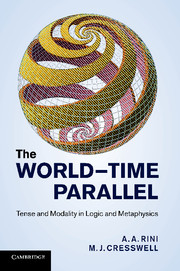Book contents
- Frontmatter
- Contents
- Preface
- Introduction
- PART I TRUTH AND INDEXICALITY
- PART II PREDICATE LOGIC: TENSE AND MODAL
- PART III TIMES AND WORLDS, OR TENSE AND MODALITY?
- 9 Primitive modality and primitive tense
- 10 ‘Modalism’ and ‘tensism’
- 11 The present and the actual
- 12 Utterances
- 13 Relativity
- PART IV DE RERUM NATURA
- Appendices
- Bibliography
- Index
12 - Utterances
from PART III - TIMES AND WORLDS, OR TENSE AND MODALITY?
Published online by Cambridge University Press: 05 March 2012
- Frontmatter
- Contents
- Preface
- Introduction
- PART I TRUTH AND INDEXICALITY
- PART II PREDICATE LOGIC: TENSE AND MODAL
- PART III TIMES AND WORLDS, OR TENSE AND MODALITY?
- 9 Primitive modality and primitive tense
- 10 ‘Modalism’ and ‘tensism’
- 11 The present and the actual
- 12 Utterances
- 13 Relativity
- PART IV DE RERUM NATURA
- Appendices
- Bibliography
- Index
Summary
In preceding chapters we have taken it as obvious that the sentences of natural language – in our case English – are tensed. On the indexical account presented in Chapter 1,
(1) It rained yesterday at Waitarere
is true at a time because there was rain on the previous day. That is, (1) is true at t1 (in a world w) because
(1) It is raining at Waitarere
is true at a time t2 (in w) on the day preceding t1. This account takes as evident the relation ‘α is true at t in w’. That is to say we have taken it that (2) is something which can, in this or that possible world, be true at one time and false at another. We call this account ‘indexical’ because worlds and times are what on p. 8, above, are called indices of truth, meaning that truth is truth at a time in a world.
Some philosophers have wanted to make a difference between the sense or proposition expressed by a sentence, and the sense or proposition expressed by an utterance. Thus Mellor 1981, p. 36, argues that while tensed sentences cannot always be translated without loss of content into untensed sentences yet the content of utterances, or ‘tokens’ as he calls them, is untensed. This latter account is often referred to as the ‘token-reflexive’ theory of tense, and, as we shall explain, it is easily confused with the indexical theory.
Information
- Type
- Chapter
- Information
- The World-Time ParallelTense and Modality in Logic and Metaphysics, pp. 132 - 141Publisher: Cambridge University PressPrint publication year: 2012
